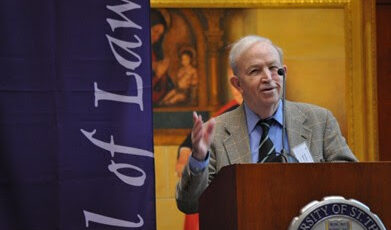On the occasion of the Zoryan Institute’s 40th Anniversary, once a month we will be highlighting one of our ZI Heroes. Not only have these individuals made invaluable contributions to the Institute and its mission, but they have also left their mark on the field of Genocide and Human Rights Studies.
Prof. Roger W. Smith, Professor Emeritus of Government at the College of William and Mary in Virginia, is a deeply humane, charismatic and committed intellectual who has been an active force in genocide education, and in the scholarly study of genocide and its denial for four decades. As one of the pioneers in the fields of Genocide and Comparative Genocide Studies, and as one of the founders of the International Association of Genocide Scholars, he has shaped an entire field of study and helped foster its growth.
Prof. Smith first became involved with the Institute in 1985, when he was invited to participate in a seminar on genocide denial. The subject captured his interest, and he has been involved with the Institute for nearly 40 years. In his capacity as Chair of the Institute’s Academic Board since 2004, Prof. Smith has played a pivotal role in conceptualizing the Institute’s programming. He was instrumental in the development and success of the Genocide and Human Rights University Program (GHRUP), of which he served as Program Director for many years. Prof. Joyce Apsel, GHRUP Course Director, Clinical Professor of Liberal Studies at New York University, and President of the Institute for Study of Genocide, had this to say about Prof. Smith’s contributions to the program:
“As initially a teacher in GHRUP, I learned a great deal from listening to Roger’s teaching sessions on denial and other topics; and, from watching how masterfully he connected with students intellectually and on a personal level. His sense of humor, combined with depth of knowledge and insights provided an inspiring model for faculty as well as students.”
Offering similar sentiments, Prof. William A. Schabas, Professor of International Law at Middlesex University, added:
“As part of [the GHRUP] roster of lecturers, I was able to watch first-hand [Roger Smith’s] masterful leadership, insightful observations, and authoritative command of the subject. He was particularly keen on issues relating to the difficult encounter between the repression of incitement to racism and genocide and the protection of freedom of expression.”
Speaking to Roger’s contributions to Genocide Studies International, Prof. Henry Theriault co-editor of the journal said:
“Roger’s keen insights into the nuances of genocide issues were crucial to the vibrancy of the journal and made an otherwise dark and painful subject matter not just tolerable but meaningful and confirming. It is safe to say that the very existence of GSI owes much to Roger’s leadership.”
Early on in his career, Prof. Smith began focusing much of his work on the Armenian Genocide. In 2000, he gave testimony before the U.S. Congress relating to the Armenian Genocide Resolution (H. Res. 596). In 2008 he was awarded the Movses Khorenatsi Medal by the president of Armenia “for his considerable contribution to the international recognition of the Armenian Genocide”.
“Roger W. Smith’s contributions to the field of Genocide Studies, along with his contributions to the mission of the Zoryan Institute, have been immense, and they are intertwined. His theoretical approach and analysis of denial are so profound that you could read an article of his from 35 years ago and be struck by how accurate and relevant it still is today.”
Expressing his sincere gratitude for Prof. Smith’s immeasurable contributions to the Zoryan Institute and the field of Genocide Studies, and his unflinching promotion of truth and universal human rights, the Institute’s President, Greg Sarkissian, said:
“Roger’s courage and strategic guidance, along with his personal mentorship, and innate ability to analyze issues holistically, make him both a tremendous scholar and leader. His ability to look at issues from all angles has provided the Institute with the confidence to pursue groundbreaking undertakings, such as the GHRUP. We will forever be grateful for his efforts.”
